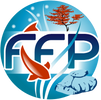Food contains various elements, such as proteins, fats, carbohydrates, vitamins and minerals, which are essential for all animals to maintain healthy bodies, grow and reproduce. Here we explain what these elements are and why they are important components of food.
Proteins are made up of amino acids. Thirteen essential amino acids should be included in any fish diet, although there are about 20 found in natural proteins. An adequate diet contains sufficient quantities of both essential and nonessential amino acids to allow the koi to grow, repair damaged tissue and produce either eggs or sperm. Deficiency of protein or any of the essential amino acids causes koi to grow more slowly and, if this dietary problem continues, can result in a deformation of the spine.(Spine deformities may have a number of other causes, such as disease, however).
Fats provide a source of energy to koi; their important role is in providing fattyacids, such as triglyceride and phospholipids; vital components of membranes surrounding all cell walls. Koi can make almost all of the fatty acids they need with the exceptions of linoleic and linolenic acids, which are essential and must be provided in the food. Linolenic acids are required for growth.
All fats are made up in a similar way to proteins, but of fatty acids, rather than amino acids, bonded together with glycerol. If essential fatty acids are omitted from the diet, symptoms of fin erosion and heart and liver problems may result. Fats have a low melting point and are thus more easily digested by koi. They are found in fish, soya and corn oils and in high concentrations of wheatgerm. Fatty acids become rancid on exposure to air - a chemical process known as oxidation. In koi, the liver is the chief organ for storing fats and if stale food is fed to them it can result in disease and death. Unfortunately, rancid food has no outward appearance of having 'gone bad'. It is, therefore, worth buying smaller packs of food, rather than a large quantity which is utilized slowly, and never keep food from one year to the next.
Carbohydrates also form a scource of energy for koi but fish metabolize them lessx readily than omnivorous birds or mammals. Too much carbohydrate is very bad for koi health, resulting in either degeneration of the liver or an excessive storage of these substances as glycogen, leading ultimately to heart failure.
Vitamins are essential for the normal metabolism and growth of koi, and requirements of some are increased during spawning. Vitamins are complex-structured substances, needed in only small amounts in the diet, but deficiencies can cause clinical disorders.
Vitamins are divided into two categories: fat soluble and water soluble. Fat-soluble vitamins are found in a variety of forms, all of which are metabolized slowly and can be stored in the body fat. An excess of fat-soluble vitamins can lead to a condition known as hypervitaminosis, which, depending on the vitamin, can lead to clinical disorders. Water-soluble vitamins are easily absorbed and are not usually excreted.
All essential vitamins are supplied in more than adequate quanities in proprietary koi foods and it would be unusual for the hobbyist to meet clinical symptoms associated with defieciency.
Minerals, too, aid basic metabolic functions, as well as performing their own duties, which include building skeletal structures, osmoregulation, building of nerves, and maintaining the efficiency of gaseous exchange in the blood system. Little is known about mineral deficiencies in fish, probably because most minerals are absorbed from the surrounding water. Normally 12 percent of the diet is made up of minerals, being contained in fish food in the form of ash.
